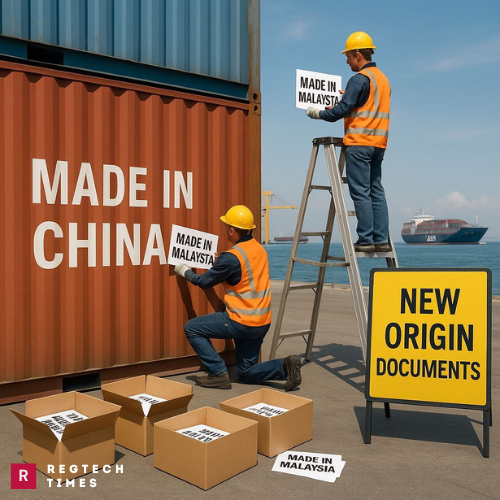China is facing a tough challenge in exporting goods to the United States due to steep tariffs, but some Chinese exporters have found a way to bypass these costs. This has raised serious concerns about the integrity of international trade. The tactic involves using third countries, like Malaysia and Vietnam, as middlemen to reroute Chinese products, making them appear as if they come from these nations instead. This process is known as “place-of-origin washing,” and it’s helping Chinese goods sneak past high U.S. tariffs.
The High Cost of U.S. Tariffs
In recent years, the U.S. has imposed massive tariffs on products imported from China. Some of these tariffs can be as high as 245 percent, meaning that Chinese products are taxed heavily when they enter the U.S. market. This makes Chinese goods much more expensive for American buyers and less competitive compared to products from other countries.
To avoid paying these high tariffs, some Chinese exporters have come up with creative ways to get their products to the U.S. without directly shipping them from China. Instead, these goods are sent to other countries, where they are repackaged or only slightly altered, and then shipped to the U.S. under false pretenses.
What is ‘Place-of-Origin Washing’?
“Place-of-origin washing” is a process where Chinese products are rerouted through third countries like Malaysia or Vietnam. These products often undergo very little processing or only minor repackaging in these countries before being sent to the U.S. The key part of this process is the creation of fake documents. These documents, such as certificates of origin, falsely claim that the products were made in these third countries, rather than China.
Tense Crossroads: Vietnam Vows Crackdown After U.S. Finds China Label Trickery
The products are then shipped from these third countries to the U.S., where they enter under much lower tariffs, sometimes only a fraction of what the original Chinese tariff would have been. This tactic allows Chinese exporters to save significant amounts of money and keep their products competitive in the U.S. market.
Why is Malaysia the Top Destination?
Malaysia has become a popular destination for this practice. The country’s tariffs are much lower than those of the U.S. For example, while the U.S. imposes a 245 percent tariff on some Chinese goods, Malaysia only has a 24 percent tariff on products coming into the country. This makes Malaysia an attractive place for Chinese exporters to send their goods before rerouting them to the U.S.
Freight brokers, who help manage the shipment of goods, are actively promoting this service. Some are even advertising on Chinese social media platforms, offering “place-of-origin washing” to help businesses bypass U.S. tariffs. These brokers help Chinese companies with the entire process, from shipping goods to third countries to creating fake documents and certificates of origin.
Tariff Dodging Exposed! South Korea Seizes $20 Million in Fraudulent Made in Korea Goods
The process is usually very simple, with goods passing through third-country warehouses, where they might undergo only minimal changes or repackaging. Once this is done, the products are ready to be shipped as though they were made in Malaysia or Vietnam, rather than China.
The Impact on Global Trade
The practice of place-of-origin washing is undermining the effectiveness of tariffs, which are meant to discourage Chinese imports into the U.S. By rerouting goods through third countries, Chinese exporters are avoiding the intended effects of these tariffs. As a result, the U.S. is losing out on its intended trade protections, and other countries are being dragged into this situation.
This practice is not limited to just Malaysia. Other countries like Vietnam and South Korea are also reportedly involved in this type of trade manipulation. In fact, South Korea recently uncovered over $20 million in fraudulent trade linked to goods bound for the U.S. This has raised alarms about the reliability of trade practices and the challenges of enforcing tariff policies.
Authorities in countries like Malaysia are becoming increasingly concerned about the impact this has on their trade reputation. Malaysia’s deputy minister has called for stronger oversight in industries like rubber gloves, which are often part of this fraudulent trade. There are fears that these practices could harm legitimate businesses and lead to stricter regulations that could affect the entire industry.
No Mines, No Jobs—Just Pain: De Beers Slams U.S. Tariffs as Pointless and Harmful
In response to this growing issue, there are calls for investigations into the use of third countries as a means to evade tariffs. Trade groups are urging governments to take action and prevent the abuse of customs loopholes. If left unchecked, this practice could spread further, making it even harder to regulate and enforce tariffs on Chinese goods.
A Growing Trend
As the U.S. continues to impose high tariffs on Chinese imports, this practice is expected to grow. Chinese companies are finding new ways to offload their goods and avoid the costs associated with U.S. tariffs. Meanwhile, the countries that are being used as middlemen for these goods are facing increasing pressure to crack down on fraudulent trade practices.
The practice of place-of-origin washing is also affecting other markets. As goods from China enter the U.S. through third countries, American consumers might be unknowingly buying products that are falsely labeled as coming from countries like Malaysia or Vietnam. This is creating confusion and undermining trust in the global trading system.
With more countries getting involved in this practice, enforcement agencies in the U.S. and other nations will face increasing challenges in controlling these fraudulent trade routes. While some governments are taking steps to address the issue, it remains unclear how effective these measures will be in stopping the illegal rerouting of goods.
In the end, place-of-origin washing is a complex issue that poses a significant challenge to global trade systems and tariffs. While Chinese exporters have found a way around the tariffs, the impact on fair trade and international regulations could be long-lasting.


